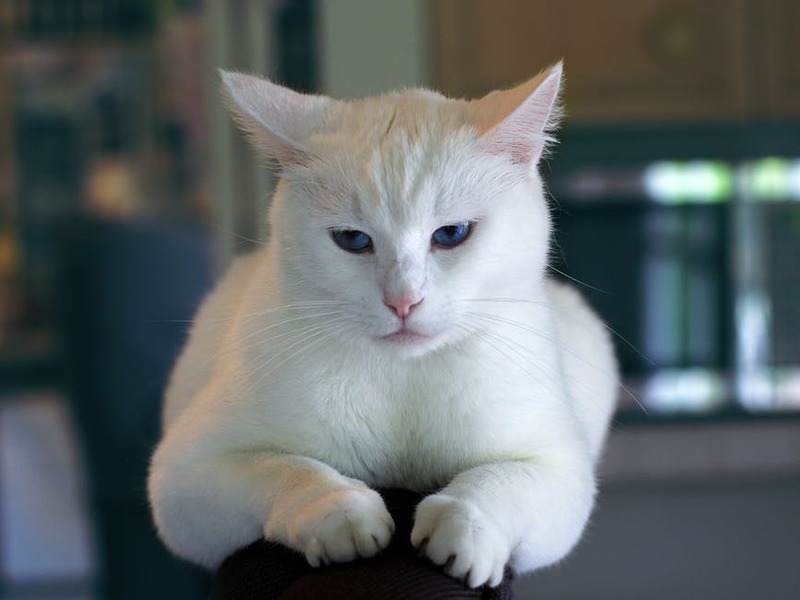
First of all, take it seriously! Cats do not cope with long-term (chronic) stress very well, and it can significantly harm their mental and physical health. The other thing to remember is that things that we often find relaxing (having friends and family around, or eating a meal together) are innately stressful to cats. In this blog, we’ll look at how to recognise stress in your cat, some of the the possible causes of stress, and finally how to manage it.
How do I know if my cat actually is stressed?
Acute, or sudden, stress is easy to identify from a cat’s body language:
- Freezing and a fixed stare at the stressful object, animal or person
- Crouching down with belly protected, tail close to the body and head low down, ears flat back and often hissing or snarling
- Rapid breathing, wide open eyes and dilated pupils, sometimes involuntary urination or defecation.
This is sometimes characterised as the “fight, flight or fright” response - the cat is preparing to either attack it’s adversary, run away from it, or freeze and hope it doesn’t notice them. It’s the sort of response you’d expect if your cat is startled by someone or something, or if they suddenly find a strange cat in their house! Acute stress also isn’t generally harmful - the problem occurs if they are stressed and then go-on being stressed for a prolonged time.
This type of chronic, or long-term, stress is often much harder to detect. Signs may include:
- Personality alterations - wanting more or less company than usual, changed grooming, feeding or toileting routines, reduced play.
- Being more easily startled or shocked by something; this is often coupled with a reduced attack threshold - in other words, they are more willing to display aggression than an unstressed cat.
- Hiding, and sometimes increased resting (although good quality sleep is often reduced).
- Inappropriate urination (e.g. urine spraying) and defecation.
- Overgrooming, sometimes even resulting in baldness (typically under the belly or on the back legs).
What causes cats to become stressed?
More or less any change, unfortunately! Cats have evolved to be small carnivores - eating anything smaller than them, fighting with anything their size (to protect their territory), but always having an eye out for anything bigger that they need to run away from.
The major causes of stress in a cat’s life are environmental:
-
Physical environment
- Cats are very concerned about resources - is there enough for them - and safety - can they hide or escape if something nasty turns up?
-
The key questions to ask yourself include:
- Are there enough feeding stations and litter trays for all the cats?
- Can the cat choose a secluded location, or an open one, if they prefer?
- Has anything unexpected changed recently, like new furniture or (even) a new room?
-
Human environment
- Cats are a bit split-personality when it comes to humans. They love to have us around (especially when they want feeding or to play a game!) but they’re instinct is to be scared of us (in case we try and eat them).
- As a result, cats tend not to love people as a whole, but some specific people (i.e. hopefully you and your family).
- Any change to this human environment (new people in the house such as a new partner, visitors, or builders in; or people they were familiar with being missing, such as children going away to college or Uni) tends to upset them and they can take a while to settle down again.
-
Feline environment
-
Important though the physical and human environment are, it’s other cats that make or break a cat’s stress levels. Many cats cannot stand others of their own species; where cats do get along, it’s usually because of one of three factors:
- They grew up together - siblings, for example, are often happy to live together.
- They’ve been together a long time and learnt how to get along.
- They don’t have to interact at all! This sort of armed truce is really common, where one cat has the kitchen and the hall, for instance, while the other has the study and the sitting room. Sometimes, they will “time-share” different areas.
- However, all of these social arrangements are potentially fragile, and anything that upsets the balance can rapidly spiral out of control - the death of a friend, or a new cat moving in, or a big nasty tomcat prowling around outside the windows.
Well, if at all possible, try to work out why they’re stressed in the first place - and then if possible remove it. Resource stresses are usually the easiest to fix - make sure that there are enough feeding stations and litter trays for every cat, plus one spare; and that they are in a variety of locations, some more secluded etc.
In many cases, the stressor is temporary (builder or workmen in, for instance). However, some changes are more permanent and harder to resolve (for example, divorcing the husband because the cat doesn’t like him is not normally a good solution). In these situations, you need to be a little more proactive.
Any level of stress in cats can be improved with the use of Feline Facial Pheromone (Feliway©), and we strongly recommend that you use a diffuser if there is any stress level. Other products such as casein tablets (Zylkene©) may also help with short-term stress.
In more severe cases, we’d recommend that you speak to a feline behaviourist; and in some cases, prescription medication may be appropriate.
If your cat is stressed, try to work out why - then come and talk to one of our vets to put together a plan of campaign!
